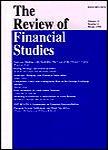-
作者:Guo, Hongye
作者单位:University of Hong Kong
摘要:The U.S. stock market's return during the first month of a quarter correlates strongly with returns in future months, but the correlation is negative if the future month is the first month of a quarter, and positive if it isn't. These correlations offset, consistent with the well-known near-zero unconditional autocorrelation, yet they are pervasive, present across industries and countries. The pattern accords with a model in which investors extrapolate announced earnings to predict future earn...
-
作者:Voss, Paul
作者单位:Hautes Etudes Commerciales (HEC) Paris
摘要:According to existing theories, short-term creditors promote corporate governance by responding quickly to new information. I show that this very feature of short-term debt can also undermine corporate governance. Though moderate levels of short-term debt improve the efficacy of blockholder exit and increase blockholders' incentives to engage with the firm, high levels of short-term debt impair governance. In particular, high levels of short-term debt render the threat of exit noncredible, mak...
-
作者:Wu, Liuren; Zhang, Yuzhao
作者单位:City University of New York (CUNY) System; Baruch College (CUNY)
摘要:This paper proposes a top-down linear option pricing model that unifies the pricing of different option contracts not by assuming common dynamics but by imposing common pricing on each risk source in proportion to decentralized risk estimates. The model generates significantly better pricing performance than existing bottom-up models. Its high-dimensional risk structure effectively explains the options return variation, allowing for the seamless integration of option pricing with risk manageme...
-
作者:Charles, Constantin
作者单位:University of London; London School Economics & Political Science
摘要:I show that memory-induced attention can distort prices in financial markets. I exploit rigid earnings announcement schedules to identify which firms are associated in investors' memory. Firms with randomly overlapping earnings announcements are associated in memory because many investors experience them in the same context. Months later, when only one of the two firms announces earnings, this context is cued, and triggers the recall of the other, associated firm. On such days, I find that mem...
-
作者:Goyal, Amit; Saretto, Alessio
作者单位:University of Lausanne; Swiss Finance Institute (SFI); Federal Reserve System - USA; Federal Reserve Bank - Dallas
摘要:A number of delta-hedged equity option strategies exhibit very large average returns. We show that much of the profitability of these strategies can be explained by an IPCA factor model. The economic magnitude of the return-adjustment produced by IPCA is impressive: even before transaction costs, the average IPCA alpha of 46 long-short trading strategies constructed on previously discovered signals, is close to zero and contrasts with average realized returns of over 80 basis points per month....
-
作者:Goedker, Katrin; Jiao, Peiran; Smeets, Paul
作者单位:Bocconi University; Leibniz Association; Ifo Institut; Maastricht University; University of Amsterdam
摘要:We provide experimental evidence of a positive memory bias that affects individuals' beliefs, decisions to reinvest, and overconfidence in the stock market. Individuals overremember positive investment outcomes of chosen assets and underremember negative ones. Based on their memories, subjects form overly optimistic beliefs about their investment, reinvest too much, and become overconfident about their investment ability relative to others. We further provide evidence on motivation driving the...
-
作者:Andries, Marianne; Bianchi, Milo; Huynh, Karen K.; Pouget, Sebastien
作者单位:University of Southern California; Universite de Toulouse; Universite Toulouse 1 Capitole; Toulouse School of Economics
摘要:In an investment experiment, we show variations in information affect beliefs and decision-making within the information-beliefs-decisions chain. Subjects observe the time series of a risky asset and a signal that, in random rounds, helps predict returns. Subjects form extrapolative forecasts following a signal they perceive as useless, and their investment decisions underreact to their beliefs. If the same subjects perceive the signal as predictive, they rationally use it in their forecasts, ...


